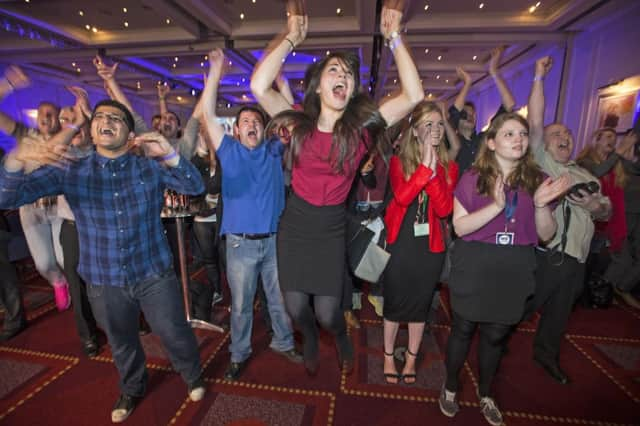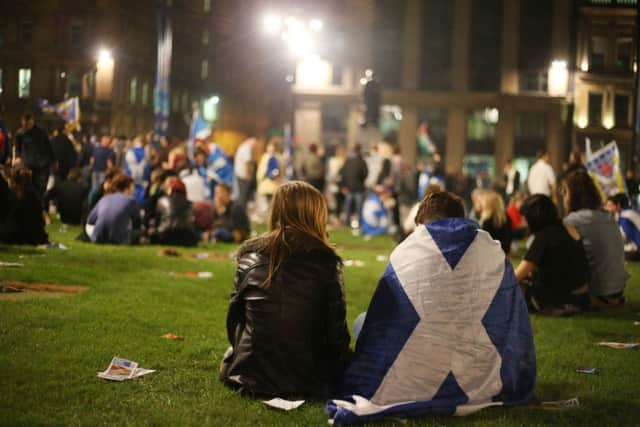Scottish independence: Scotland votes No


Scotland today rejected independence and voted to remain part of the United Kingdom at the end of the most intense political campaign the country has ever seen.
The silent majority finally raised its voice on a tense yet utterly compelling night of political history.
Advertisement
Hide AdAdvertisement
Hide AdDuring a referendum that attracted record numbers of voters and was hailed as a triumph of democracy, the people voted to maintain the 307-year Union.


A decisive No vote was the culmination of two and a half-years of vigorous and at times edgy campaigning, which looks certain to change the constitutional map of Britain for ever.
As the votes were counted, a grim-faced Alex Salmond was seen boarding a private jet at Aberdeen airport just after 3am. Photographed with his wife Moira, the First Minister was contemplating his political future after the referendum he had strived for throughout his life delivered a telling blow against him.
The promises to deliver more powers to Holyrood made by the UK party leaders during the campaign were outlined in an early morning statement by David Cameron, which recognised the need to bring the United Kingdom together and deliver further devolution for not just Scotland, but England, Wales and Northern Ireland.
With turn out at well over 80 per cent, the vote saw the economic warnings of the Better Together campaign overcome a powerful and impressive grassroots campaign run by Yes Scotland.
Reacting to the result, the Deputy First Minister Nicola Sturgeon spoke of her “deep personal and political disappointment” saying she had fought the hardest campaign of her life.
Ms Sturgeon indicated she would be prepared to work with the UK parties to deliver more powers to the Scottish Parliament and claimed that the vote was not a mandate for the status quo.
Advertisement
Hide AdAdvertisement
Hide Ad“I will work with anybody and do anything I can to deliver substantial powers for the Scottish parliament, that’s beyond any doubt,” she said.
The Prime Minister’s plans were outlined by the Conservative chief whip Michael Gove said the UK would see a major constitutional overhaul which will hand more powers to all UK nations - and finally solve the so-called West Lothian Question.
This is the long standing conundrum which allows Scottish MPs at Westminster to vote on matters like health and education which are controlled in Scotland by the Holyrood Parliament. It has fuelled growing anger among Tory backbenchers, especially with the prospect of even greater powers for Scotland regardless of the referendum outcome.
“The Prime Minister will say much more later today,” Mr Gove said today.
“But I think its widely accepted across the political spectrum that there are some issues which affect Northern Ireland, Welsh and English voters which and need to be decided in a way that respects the majority of opinion in those parts of the United Kingdom.”
He added: “If as seems likely there is a No vote, then the Prime Minister will be saying more about not just the need to make sure that the interests of Scotland are catered for but also how do we keep the UK together and what that means for Northern Ireland, Wales and Northern Ireland.”
All three pro-union parties have set out plans for greater devolution for Scotland and say an agreed timetable will be in place by the end of the year, with legislation published by the end of January.
Mr Gove said there will be a “similar sense of urgency” in bringing forward proposals for change in the other UK nations as well.
Advertisement
Hide AdAdvertisement
Hide AdMr Gove, a Scot originally from Aberdeen, said the plans would stop short of an English Parliament being introduced.
But he added: “The central thing, I think is that there needs to be change in order to ensure that Westminster works better for the people of England Wales and Northern Ireland.”
Signs that the other main UK parties were coalescing around that position came when the Labour MP Jim Murphy said the referendum could inspire an “awakening” of politics in England.
Mr Murphy said there was a “disconnect” between the “village of Westminster” and the great English cities like Liverpool, Manchester and Newcastle.
While emphasising that it was not his role as a Scot to tell the rest of the UK how to conduct its politics, Mr Murphy suggested that the referendum – whatever the outcome – could lead to a realignment of powers south of the border.
Mr Murphy, who played a prominent role in the Better Together campaign with his 100 Towns in 100 Days tour, also said he thought that 16 and 17-year-olds should be given the vote in the next General Election.
The extension of the franchise to include more teenagers in yesterday’s poll had been a huge success, Mr Murphy argued.
Teenagers had been “enthused, informed, clever and sussed” and he said there was a case for attempting to extending the franchise in the rest of the UK for next year’s General Election.
Advertisement
Hide AdAdvertisement
Hide AdDanny Alexander, Chief Secretary to the Treasury, said there should be “wider” constitutional change across the UK.
It was the campaign that saw Alistair Darling and Alex Salmond clash in two televised debates, the resurrection of Gordon Brown as a formidable, front line politician and Better Together was criticised for relentless negativity and obsessing on unanswered questions over the currency.
But despite the criticism, Better Together emerged triumphant in an early morning of high drama.
The first declaration of the night came at 1.30 am and was bad news for Yes Scotland with No coming out on top in Clackmannanshire, an area of traditional SNP strength.
The No side took 53.8 per cent of the vote with 19,036 votes compared with 46.2 for the Yes campaign (16,350).
Orkney was next with an utterly emphatic victory for No. The Lib Dem stronghold displayed its commitment to the United Kingdom with No polling 67.2 per cent of the vote with 10,004 people voting against independence compared with just 32.8 per cent for Yes (4,883 votes).
Although Orkney had been expected to favour remaining in the Union, the Lib Dem MSP Liam McArthur said he was surprised at the size of the margin.
“I think we were always confident that Orkney would vote to remain in the United Kingdom but the scale of the what has happened has surprised us.
Advertisement
Hide AdAdvertisement
Hide Ad“I think our campaign stepped up a gear when there was a narrowing of the polls. That concentrated minds. What we saw was No supporters starting to be more ostentatious and outward – concentrating their support.”
Mr McArthur added that the referendum suggested that there was a “mood” for constitutional change across Scotland.
Shetland followed at around 2.40 am and again it was a strong No vote with people voting in favour of keeping the Union by a ratio of more than two to one.
On Scotland’s most northerly extremity Yes only managed to secure 36.29 per cent of the vote compared with 63.71 per cent for No. The 5,669 Yes voters were heavily outnumbered the 9,951 voting No.
Although the first results were encouraging for the Better Together campaign, Clackmannanshire, Orkney and Shetland are among the most sparsely populated local authority areas, so independence supporters remained hopeful that those results could be reversed elsewhere in the country.
In the Eilean Siar local authority, the Western Isles, the result was much tighter, but was still a win for the Better Together campaign. Although another area with a small population, the outcome of the vote in the Hebrides was seen as an important symbolic moment. As an area where the SNP have done well in parliamentary elections, Yes Scotland had hoped for a far better result.
There was encouragement for Yes when Inverclyde declared at around 3.30 am. A far stronger showing for Yes delivered a vote of 27,243 for independence - agonisingly short of the 27,329 for No.
Yes achieved 49.92 per cent of the vote, marking the first time during a long night that Yes looked close to emerging as the most popular option.
Advertisement
Hide AdAdvertisement
Hide AdIn the far more heavily populated local authority area of Renfrewshire, the 117,612 electorate voted No on a 53 per cent/47 per cent split.
Dundee was the scene of Yes Scotland’s first triumph. The Tayside city, where Mr Salmond had been greeted like a hero during the campaign lived up to the “Yes city” nickname the First Minister gave it. Fifty-seven per cent of Dundonians voted for independence, but there was anxiety amongst Yes strategists that the margin of victory was not enough to stem the No tide.
On a night of extraordinary participation the turn-out on the banks of the Tay, where 251,237 people cast their votes, was relatively low on 78.8 per cent. Nevertheless Dundee’s willingness to embrace independence, cut the No camp’s lead to just 6,385 votes when the clock reached 5.00 am.
Momentum for Yes gathered when a great roar went up at the West Dunbartonshire count. Yes gathered 33,720 votes to give it 54 per cent of the vote.
On an early morning of almost unbearable drama, the pendulum then swiftly swung in the other direction when the Midlothian, East Lothian and Stirling council results came out.
Midlothian was won by Better Together with 33,972 voting No – a percentage of 56 per cent.
East Lothian followed suit with 61.7 per cent of the electorate putting their cross in the No box. The total number of No voters came to 44,283.
In Stirling, once a Conservative strong hold and the base of the former Tory Scottish Secretary Michael Forsyth, a strong No vote of 59.8 per cent (37,153 votes).
Advertisement
Hide AdAdvertisement
Hide AdShortly afterwards Falkirk also declared for No with 53 per cent (58,030) voting against breaking up the United Kingdom.
At a Better Together gathering in Glasgow’s Marriot Hotel, the flurry of results in the favour were greeted with whoops of delight.
Wandering among the crowd was Danny Alexander, the Chief Secretary to the Treasury, who said: “my gut feeling is that Scotland has voted no but I’m not going to call it just yet. If it is a No vote it will be a welcome end to two years of campaigning but the work will begin to deliver the change that we have promised. The people of Scotland want change but want it within the UK. If that is the case it puts the pressure on us to deliver.”
The soundtrack at the Better Together party was carefully themed: ‘Come together’ by The Beatles’ and ‘Lets Stay Together by Al Green’ and then another ‘Come Together’ this time by Primal Scream. The hotel’s main conference room had been accessorised for the evening with a mini-stage now flanked with a back drop of red hearts on which is written one of the campaign’s slogans: “Love Scotland Vote No”. Four giant projector screens had been erected in each of the room’s corners two of which were broadcasting BBC and one each screened SKY and STV. In the centre of the room was a table with bottles of chilled wines and on either side a Indian buffet.
Brian Wilson, the former Labour cabinet minister said last night that if the nation did vote No then it would by the high water mark of the independence campaign. “I say that as someone who generally subscribed to the view that devolution would lead to this moment. I don’t think that we will see something like this again, people will be reluctant to get into this for a number of years. We don’t know what will happen in 20 or 30 years but I can’t see if sooner.